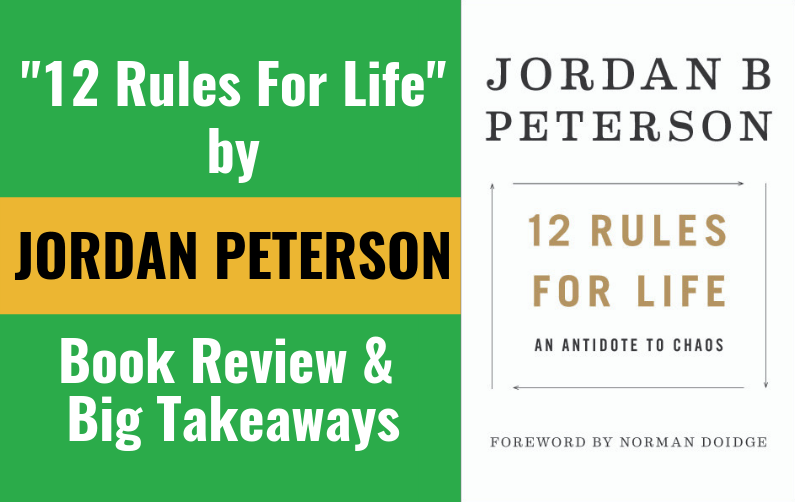This morning’s book was “12 Rules For Life” by Jordan Peterson (Professor of Psychology at the University of Toronto).
When I was first recommended this book several months ago, I found it hard to get into for some reason. However, a few people I respect kept recommending it, so I gave it another shot.
With that, said, here’s my summary, review and takeaways…
Rule #1: Stand Up Straight With Your Shoulders Back
Peterson starts off the book by discussing lobsters, and how the pecking order is determined at the bottom of the ocean. Basically, they determine the pecking order by fighting each other.
Except, most of the fights are determined before any punches are thrown. When the lobsters come face to face, they size each other up. Most of the time, it’s clear who the more dominant lobster is.
The least confident lobster can immediately tell who the least confident lobster is.
Of course, this is a metaphor for how things work in the real world for us.
If you walk around with a straight back and your shoulders back, other people will view that as a signal of confidence.
Of course we know people conveying confidence get treated differently than people who convey weakness (slouched posture, shoulders slumped forward) and they are more influential.
With that, said, here’s my summary, review and takeaways…
Rule #2: Treat yourself like someone you are responsible for helping.
Peterson points out, most people are better at filling prescriptions for their dogs than themselves.
Why is it that we are willing to take better care of others – even animals or even cars- than we are ourselves?
Peterson says, is that we don’t believe that we are worth helping. This is a mindset we must change if we want to get the most out of our lives.
We get our pets the best foods and put the best gas in our cars, but we may eat like crap at times.
Action Step: Take a look at your life and ask yourself some simple questions, starting with this one: “What might my life look like if I were caring for myself properly?”(Ex. Exercise, get more sleep, eat better, travel etc.)
Then, make a promise to do those things for yourself, no matter what.
Rule #3: Make friends with people who want the best for you.
You can’t choose your family, but you can and should choose your friends. Here’s a question that Peterson suggests we ask ourselves:
“If you have a friend whose friendship you wouldn’t recommend to your sister, or your father, or your son, why would you have such a friend yourself?”
Rule #4: Compare yourself to who you were yesterday, not to who someone else is today.
These days, if we’re not careful. we can easily fall into Compare-itis, especially with social media. We can get caught up comparing our challenging phases of life to someone else’s highlight reel.
As Peterson points out, we are all unique individuals, dealing with unique sets of circumstances in distinct stages of our lives.
Because of that, there is no definitive bar that you need to compare yourself against.
Instead, compare yourself to something that you have direct control over – where you are today compared to where you were yesterday.
If you don’t like what you see, make some changes. Today. Not tomorrow.
Rule #5: Do not let your children do anything that makes you dislike them
Here Peterson suggest that you look at things your children do that you dislike(having tantrums etc.)
If their actions have that kind of effect on you, imagine the effect they’ll have on people who don’t love them like you do.
Then work with your children to improve that behavior.
Rule #6: Set Your House In Perfect Order Before You Criticize The World
When things go wrong in your life, take 100% accountability for the results. It’s easy to blame your circumstances or other people for the bad things that happen to you.
Get to work finding the things in your life that you know you should stop doing, and stop doing them. (Ex. Make peace with your estranged family member before you give other people relationship advice. And so forth).
Don’t waste time questioning things that you know are wrong. Just stop doing them, immediately.
Keep on going until you have your house in perfect order, and then, and only then, turn your attention to criticizing the outside world.
You’ll find yourself never criticizing others because working on ourselves is a never-ending process. The point, obviously, is that it’s more helpful to fix yourself than try to fix other people or circumstances…
And just imagine a world where no one criticized others and we were all just focused on getting out own “house” in order.
A great side benefit is that it’ll help in creating the right level of humility in your life.
Rule 7: Pursue what is meaningful, not what is expedient.
When we focus only on doing what is expedient in the moment, we transfer bad outcomes to our future selves, or even worse, other people.
When we pursue what is meaningful, we often find ourselves doing the exact opposite – giving up something today so that something better might be attained in the future.
Meaning emerges when our impulses are regulated, organized and unified.
The ultimate meaning is to strive to make the world a better place.
Not just for you, but for everybody. Peterson suggests that when we do this, we’ll experience ever deepening meaning. It’s not happiness or bliss, but something different.
It requires courage and sacrifice to pursue what is meaningful over what is expedient.
Rule #8: Tell the truth. Or, at least, don’t lie
Why not lie?
Why not lie and distort the truth to smooth things over with people, to avoid conflict or hurting people’s feelings?
Because when we do, things fall apart. He’s not only talking about the lies that we speak out loud, but also the lies that we live out.
He asks us to imagine going to engineering school because our parents want us to, even though we don’t want to.
We start telling ourselves that, yes, in fact, I did want to be an engineer after all.
Those little lies require other little lies to prop it up, until eventually, one day, everything falls apart. Instead, try telling the truth. Be the person you want to be.
Rule #9: Assume that the person you are listening to might know something you don’t.
Here is one of my favorite lines in the whole book: “You already know what you know, after all – and, unless your life is perfect, what you know is not enough.”
Another way to think about this is that instead of walking around trying to show everybody how much you know, walk around in a continual search for things you don’t.
Quite often the person sitting across the table will surprise you with a golden nugget of wisdom you can take away and use to get better results in your life.
The most effective way to listen is to summarize what people have said to you and ask them if you have understood properly.
Sometimes you’ll hit the nail on the head, sometimes you’ll need a small correction, and other times you’ll miss the point completely.
The only thing that’s sure to happen when you follow this rule is that you’ll learn something valuable and you can learn something from everyone.
Whether it’s your neighborhood drunk who stands at the corner store, a crack addict, gang banger or your child. You just have to listen.
Rule #10: Be precise in your speech.
Being precise helps you in many ways.
#1: It ensures that you are properly understood. The less you leave for interpretation, in most cases, the better. This is really helpful, for instance, when you are talking about things that are bothering you in a relationship.
#2: Being precise about defining problems you are facing turns chaos into something you can deal with.
For instance, Peterson suggests that if we had cancer, we’d want to know exactly what kind it was, where it was, and precisely how we would get it treated.
This is the same approach, he suggests, that we should use for any problems we have in life.
#3: Being precise in what you want out of life is the best way to ensure that you get it.
Once you are precise about what you want, you can go out and get it, correct course when you aren’t making progress, and ultimately end up at your destination.
Rule #11: Do not bother children when they are skateboarding.
This section is about how parents these days have become over-protective because we want to protect our children from danger.
As long as you take the right precautions – like wearing a helmet when you are skateboarding to avoid turning your brain into mush – it’s ok to push the limits to see what you are made of.
Even if you happen to skin your knees. We need our children to push their boundaries to see what they are made of.
Allow them to make their own mistakes and even experience some pain. It’s the only way to grow.
We might also consider taking on this advice for ourselves, too.
Rule #12: Pet a cat when you encounter one on the street.
Finally, we need to learn to appreciate the small things in life when they come our way.
If you are paying attention, even on your worst days, you just might find some magic.
Like, as Peterson points out, a little girl dancing on the street because she is dressed up in a ballet costume. Or when you unexpectedly encounter a friendly cat on the street.
Or maybe even a beautiful flower or a colorful butterfly.
Then, even if it’s only for a few seconds, you’ll understand that moments like those make everything else worth it.
Which of these are your favorite? Which are you going to implement? Have you read this book yet? What were some of your takeaways from your reading or even from this summary?
Hope this served you 🙂
What is your #1 goal right now?
If you’re looking to grow your current business, I have a free case study video that reveals The EXACT Process We Use To Help Clients Add An Extra 6-7 Figures To Their Business Revenue While Cutting Their Work Time In Half. Click here to check it out.
If you’re looking to start an online business, you deserve to check out our 2-Hour Workday Blueprint™ Masterclass. It shows you step-by-step How To Fire Your Boss, Travel The World & Live Life On Your Own Terms (All While ONLY Working 1-2 Hours Per Day). You can check it out by clicking this link.
Be sure to check out other episodes, get more free content and learn more about me at http://marquelrussell.com
Did This Help You? If so, I would greatly appreciate it if you commented below and share on Facebook


P.S: Wanna see a quick case study on how we helped a client attract more high paying clients, which helped her grow from $5k per month to $50k per month? If YES, you should click here.
Copyright 2018 – MARQUEL RUSSELL – All Rights Reserved





Lovely website! I am loving it!! Will be back later to read some more. I am bookmarking your feeds also
Wow! Its like you read my mind! You seem to know a lot about this, just like you wrote the book in it or something. I think that you could do with some images to drive the content home a bit, but other than that, this is helpful blog post. A wonderful read. I will definitely revisit again.
Definitely believe that which you stated. Your favorite justification appeared to be on the internet the simplest thing to be aware of. I say to you, I certainly get annoyed while people think about worries that they plainly dont know about. You managed to hit the nail upon the top and also defined out the whole thing without having side-effects , people could take a signal. Will probably be back to get more. Thanks!
Hello mate, I just wanted to tell you that this article was actually helpful for me. I was fortunate to take the tips you actually so kindly shared and even put it to use. Your web blog article truly aided me and i also would like to inform your dedicated audience that they really have someone that has her or his thoughts fixed. Thank you once more for the excellent posting. I’ve truly bookmarked this on my favored online bookmarking web site and i also recommend everyone else do the very same.
Things used to be like that, unfortunately different elements made sure they wouldnt stay that way. Congrats on the article 😉
I think youve made some actually interesting points. Not as well many people would truly think about this the way you just did. Im actually impressed that theres so a lot about this subject thats been uncovered and you did it so properly, with so a lot class. Excellent 1 you, man! Seriously good stuff right here.
Well I really enjoyed studying it. This information offered by you is very effective for good planning.
Hello mate, I just wanted to tell you that this article was actually helpful for me. I was fortunate to take the tips you actually so kindly shared and even put it to use. Your web blog article truly aided me and i also would like to inform your dedicated audience that they really have someone that has her or his thoughts fixed. Thank you once more for the excellent posting. I’ve truly bookmarked this on my favored online bookmarking web site and i also recommend everyone else do the very same.
This really is such a fantastic useful resource that youre providing and also you give it away for free. I adore seeing web sites that understand the value of providing a top quality resource free of charge. It?s the outdated what goes around comes around program.
Your talent is really appreciated!! Thank you. You saved me a lot of frustration. I switched from Joomla to Drupal to the WordPress platform and Ive fully embraced WordPress. Its so much easier and easier to tweak. Anyway, thanks again. Awesome domain!
I used to be more than happy to find this web-site.I wished to thanks on your time for this glorious learn!! I positively having fun with each little bit of it and I have you bookmarked to check out new stuff you weblog post. Have you considered promoting your blog? add it to SEO Directory right now 🙂
I couldnt currently have asked for a better blog. You happen to be always at hand to present excellent information, going straight away to the point for straightforward understanding of your readers. Youre really a terrific pro in this area. Thanks for always being there for people like me.
Working every day by day I’m a lot more impressed by your post. Thanks for your personal efforts with expressing the following theme.
ive begun to visit this site a few times now and i have to tell you that i find it quite great actually. itll be nice to read more in the future! :p
Everything is very open with a clear description of the issues. It was really informative. Your site is very useful. Thank you for sharing!
Thanks for sharing, this is a fantastic blog article.Really looking forward to read more. Really Cool.
Hi, I seemed to be looking for Day 8 | may it be found your blog. Thank you for sharing this amazing information. With thanks!